Healthy soil is vital for growing healthy plants. This may sound obvious, but there are many factors that go into determining the health of your soil.
While some common soil problems may be easily detectable, like the consistency and texture of your soil, it will take some basic testing to measure and analyze the nutrient levels of your soil.
If you’re willing to put forth a little effort in solving those pesky soil problems, you’ll have the ability to grow and manage a healthy and beautiful garden. Here are garden soil problems and solutions you need to learn.
More...
Garden Soil Problems and Solutions
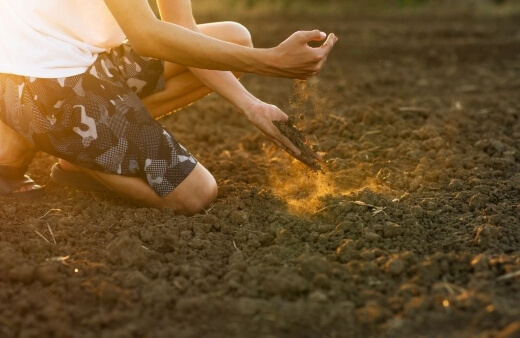
Each garden will be different in terms of what the soil needs, so be sure to learn about your garden’s needs before trying to fix it. A great way to learn more about your garden and what your soil needs to make it as healthy as can be is by using a soil testing kit, available at most garden supply retailers.
Soil testing kits typically include multiple tablets that test the pH, nitrogen, phosphorous and potassium levels in your soil and can tell you everything you need to improve its quality.
Read our review on the best soil moisture meters in Australia for 2023.
After you’ve assessed the quality of your soil, you’re ready to get started. Here are common problems and easy ways you can fix them:
1. pH level is either too high or too low
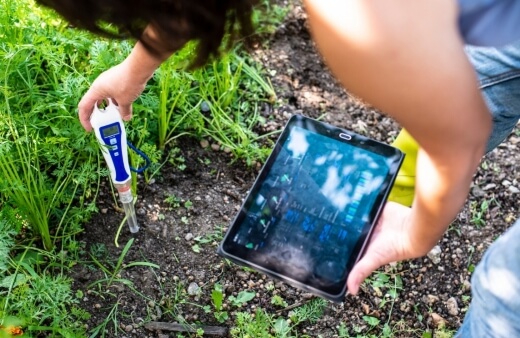
Explanation: If you notice your garden isn’t growing, pay close attention to the pH level. In order for your plants to thrive properly, the soil should neither be too acidic nor too alkaline. If it’s one or the other, you’ll need to correct it.
Solution: There are two different solutions, depending on whether your pH is too high or too low.
- pH is too high: Add pure sulfur to your garden, but be careful not to add too much if you have plants already planted in the soil. If you wish to take a different route, consider adding compost or composted manure. This will help balance the pH out.
- pH is too low: Lime is the perfect fix for gardens that have a pH that is too low. Look into recommendations from soil-testing agencies to see how much you should add.
2. Lack of essential nutrients
Explanation: Nitrogen, phosphorous and potassium are just a few key nutrients that are essential for an overall healthy garden. If you’re lacking them, you won’t see the results you were expecting.
Solution: You can add things such as compost, manure, seaweed or granite dust to give your garden the essential nutrients it needs to thrive.
3. Too much sodium
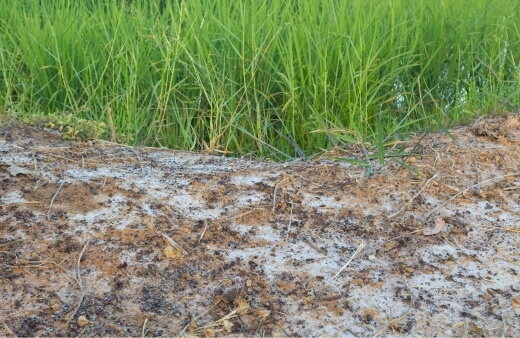
Explanation: You can normally diagnose excess sodium in your soil by observing visual symptoms. White specks of salt will be visible on the surface of the soil. This will cause toxicity in your garden.
Solution: If the sodium levels aren’t at extreme, toxic levels, try using fresh water to refresh the soil.
4. Texture problems
Explanation: New gardeners may not always pay close attention to the size of the soil particles, but size does matter. If the particles are too small, it won’t soak up the water and your garden will flood. If the particles are too large, the plants will dry out.
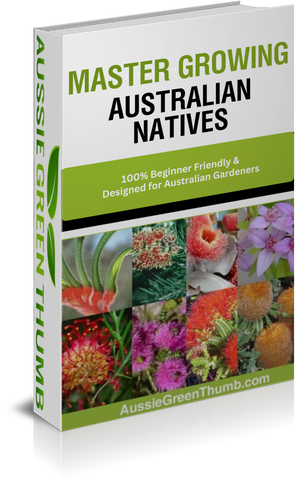

Get Your Free Guide:
Master Growing Australian Natives eBook
A Must Have Complete Guide for Every Australian Garden
Get Your Free Guide:
Master Growing Australian Natives eBook
A Must Have Complete Guide for Every Australian Garden
Solution: Adding compost or sand to your garden will help improve drainage in your garden. No matter whether the soil particles are too large or too small, this should be a quick fix for you.
5. Lack of organic matter
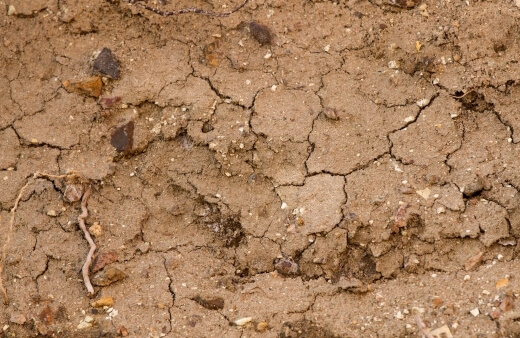
Explanation: Organic matter has many benefits to the soil, such as supplying nutrients and being highly water retentive. If the garden is missing these things, it won’t have the nutrients or water it needs to survive.
Solution: Try to prevent soil erosion from occurring. Because the organic matter is located in the topsoil, when the soil erodes, all of the organic matter gets lost as well. Also try adding compost into the soil for more organic matter.
6. Non-Water Absorption
Explanation: Often soil can become impermeable by water. This is usually because the soil is packed too tight and won’t allow anything into it. Sandy soils are easily penetrated by water whereas clay soils can resist it. However, very sandy soils struggle to retain the water and clay soils don’t. How do you correct this problem?
Solution: Trying to add some compost to your soil and digging it through where possible or using it to mulch where it’s not possible. You could even try adding water saving crystals, but this should only be viewed as a temporary measure.
7. Compacted soils
This is common with clay soils so if you want to break up the clay, apart from adding organic matter, try adding dolomite.
8. Soil-borne diseases
This isn’t common but can occur in your garden. Many gardeners who grow vegetables rotate their crops each season to guard against this happening in their beds. Apart from chemical solutions the best practice is to leave your soil fallow for a year or two.
Steps to Make Garden Soil Healthy
Harvey Ussery wrote an article for Mother Earth News titled “8 Steps for How to Make Better Garden Soil” where he describes, in-depth, the process of improving your soil through low-tillage avenues. This is such great content that I wanted to add some extra commentary for newbie gardeners to help you get the most out of your garden soil.
1. Adding Manure to Boost Nitrogen
Nitrogen is the number one chemical required for plant growth and if devoid from your garden soil your plants will continually struggle. Animal manures are a great source of nitrogen and if you can source them easily, either through your own animals or via livestock farms, they can radically improve your soil and keep your fertilising costs to a minimum.
However, there is always a balance between introducing any fertilisers into your soil because of problems with leeching or contamination of food sources.
Ussery recommends a book by Joseph Jenkins: The Humanure Handbook: A Guide to Composting Human Manure that may even give you some insight as to how to utilise your own families manure for your garden purposes.
2. Get into Composting
As they say, there is nothing new under the sun. Here are some posts I’ve written over the years that may help you get started on this important garden practice.
Compost is the engine room of any garden soil amending program and contains the complete circle of life in your garden.
3. Have Chickens to Till and Fertilize the Garden
I love this idea of getting natural workers to do the job for you. I once saw a gardener set up a garden shed on some non-arable soil and introduce thousands of earthworms into the shed. On the outside he encouraged chickens to scratch the surrounding surface in search of the earthworms.
In effect, he had two sets of workers: the first (earthworms) working the soil from beneath and the second (chickens) working the soil from on top. Within a few weeks the soil had completely changed having been worked over by both but also by being fertilised with worm castings and chicken manure.
Ussery’s idea here is a good one by encouraging the chickens to forage through piles of organic matter and, in the process, mix it into the top layers of the soil.
4. Mining Soil Nutrients with Deep Rooted Plants
Some of our least loved plants, including “weeds”, often have a usefulness that we as gardeners don’t often appreciate. These plants, such as the examples used by Ussery (comfrey, nettles, and yellow dock), are able to bring nutrients to the uppermost soil from deep beneath.
Plus, they add back nitrogen and offer great benefits by being used in compost – especially the comfrey.
Deep-rooted weeds are usually disliked by us because of the mass of seed heads they produce which is why we’re so tempted to rip them out. However, these seed heads can easily be removed from these weeds before they flower, and the weed can continue growing and ‘mining’ nutrients for your more preferred plants.
5. Growing Cover Crops
Cover crops are the plant kingdom’s alternative to using manures so heavily. Growing legume crops allows the soil to take in the nitrogen that these produce but also benefit from the organic matter of roots and foliage as they break down.
The best time to plant a cover crop is when your garden bed is lying fallow – usually in the winter months. Broadcast some seeds over the soil and rake in before watering. It will take some weeks, depending on which cover crop you chose before they can then be dug back into the soil.
You will want to do this before they begin to flower and set seed as you don’t want these crops to continue growing once your plants have been bedded in.
6. Mulching the Soil
Ussery holds tight to the no-tillage philosophy of gardening which makes a lot of common sense. Me, I prefer a low-tillage strategy instead because I believe the soil benefits from being aerated occasionally to reduce compaction and to increase the depth of fertile topsoil.
Having said that, I’m also an advocate of mulching your soil and not allowing bare spots. Mulch is like an organic blanket for your garden beds and provides composting material to increase soil activity but also shields the beds against erosion and weeds.
7. Setting Permanent Beds and Pathways
This is wise advice because it deals with the problem of soil compaction. If your soil is often tread underfoot it will result in any air being removed and drainage becoming problematic. Therefore, it’s much better to use permanent beds than to continually change them and increase this risk.
Likewise, paths should follow a similar line as well. Keeping your access to a minimum and treading in places where plants don’t grow is always the best way to work.
8. Try Out Organic Tillage
While being the last point, this is truly Ussery’s pièce de résistance and his philosophy speaks loudest through this point. He balks at using power tillers and prefers to use organic alternatives – and he offers many alternatives to choose from – instead.
His list consists of using these options.
- Chickens
- Potatoes
- Cover crops
- Mulch
- Compost
The article is well thought out and offers a heap of alternative ideas to many that are expressed within gardening magazines and the general media. I hope it helps you with making your garden soil healthy.
Start Working on these Common Soil Problems
If you notice that your plants aren’t growing quite like they should be, the quality of your soil is an important factor you should consider. Should you have other problems not include in this list, check out our guide on 5 common lawn problems and how to fix them.
If your soil is lacking in nutrients then your plants will be lacking in nutrients, almost certainly resulting in stunted growth or production. You don’t have to be an agricultural scientist to be able to identify and solve your soil problems.
We hope these listed garden soil problems and solutions get you started today!
Published on August 28, 2021 by Nathan Schwartz
Last Updated on September 20, 2024

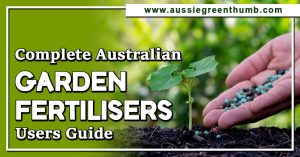
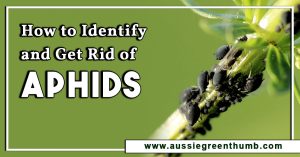

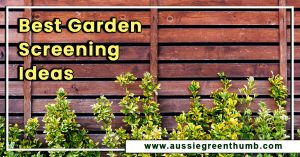
Michele Hall liked this on Facebook.
James Middleton liked this on Facebook.